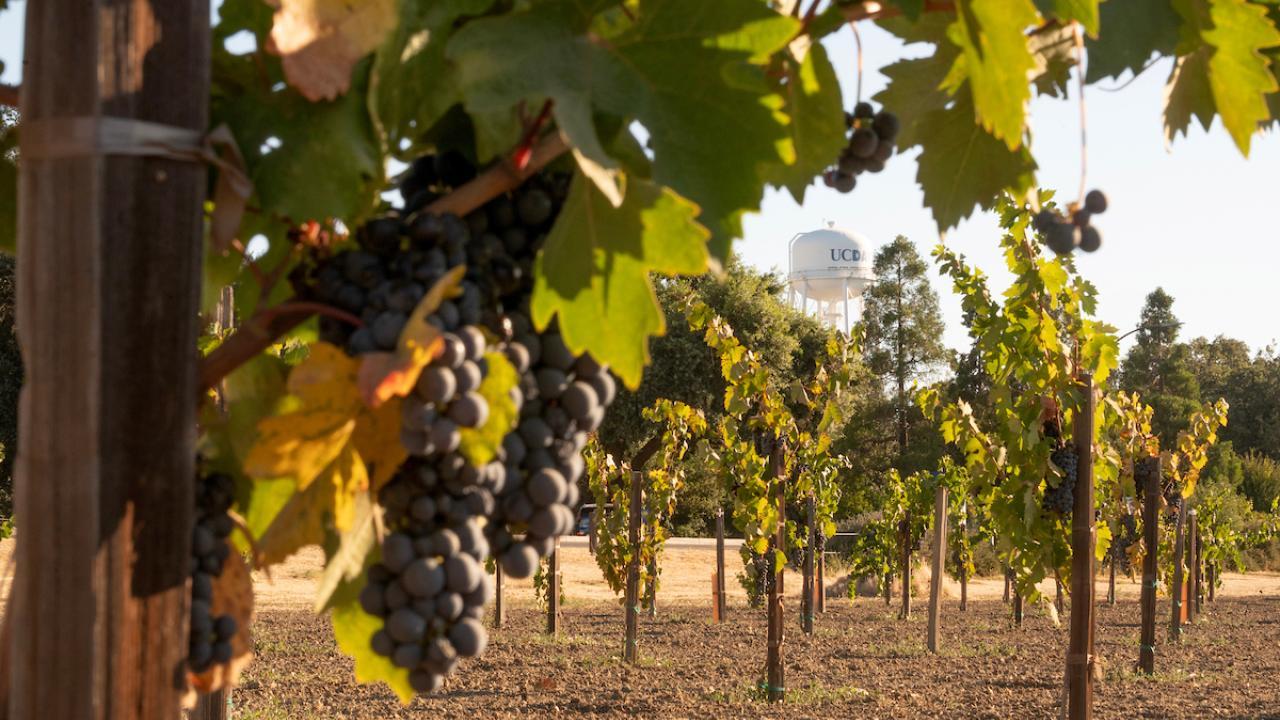The 2025 wine-grape harvest is underway, and the vineyards and research labs at UC Davis are at peak activity. Wines made in our Teaching and Research Winery prepare the next generation of winemakers for success, giving them hands-on skills to thrive in the wine industry, whether in California or other parts of the globe’s key grape-growing regions.

Research is another crucial aspect of our campus activities, with faculty addressing some of the most significant challenges facing the global wine industry.
We are developing drought-resistant rootstocks, investigating solutions for grapevine diseases, and studying the effects of smoke on wine grapes as wildfires have become an annual event in California, including the Pickett Fire in Napa County and the Gifford Fire on the central coast.
According to the United States Environmental Protection Agency, California wildfires in 2020 led to $4.2 billion in losses to the state’s wine industry due to damaged properties and grapes tainted by prolonged smoke exposure.
Our scientists bring expertise and hope, with an increased emphasis on listening to and engaging directly with industry. The majority of this wine-related work happens right here in Davis. In fact, our twelve-acre teaching vineyard is a gateway to campus as students and visitors take the UC Davis Exit from Interstate 80. This vineyard is a core element of our Department of Viticulture and Enology, housed within the Robert Mondavi Institute for Wine and Food Science, which draws students and researchers from around the world.
You’ll also find our researchers around California and the globe. Our UC Davis Chile Life Sciences Innovation Center in Santiago is home to collaborative projects related to winemaking and grape growing. Back in California, UC Davis’ Oakville Station in the heart of Napa Valley is a research hub that addresses climate, sustainability, labor, and water issues.
Wine lovers know the Oakville appellation as some of the most hallowed ground in the wine world, the home to such acclaimed wineries as Silver Oak, Harlan Estate, Robert Mondavi Winery and Opus One. In fact, the head winemaker of Opus One, Michael Silacci, earned his master’s degree in viticulture and enology from UC Davis, as did Laura Oskwarek, director of winemaking at Silver Oak.
Today’s Aggies are following in their footsteps. Cabernet sauvignon and sauvignon blanc grapes from Oakville Station are the foundation for wines sold by Hilgard631 on the UC Davis campus. Other varieties also contribute to the array of student-made wines released in June. It took over a decade of planning and the passage of two state laws to make Hilgard631 a reality.
Proceeds from these wine sales will go toward student scholarships. Another benefit is that the process allows students to get hands-on experiences making a commercial wine, all the way from production to designing the bottles and legal labels for sale. Think of it as UC Davis’ passion for education and agriculture, filled in a bottle.
Meanwhile, our researchers are exploring innovations that could be game changers for viticulture and enology. One of those is the start-up company Scout, which utilizes AI and computer vision to rapidly forecast crop yields. This helps farmers better plan for the labor needs and supplies in the winemaking process, while providing critical insights for detecting diseases and viruses that can decimate vineyards.
The Scout technology was developed by undergraduates, graduate students and postdocs in a lab overseen by Dr. Mason Earles, an associate professor of viticulture and enology. He focuses on using low-cost AI systems to provide more precise and sustainable agricultural practices.
Meanwhile, UC Davis researchers are studying grape varietals that are especially drought resistant, reusable materials and cleaning technologies to lower water and material inputs, and developing sensors to detect smoke risk in vineyards.
This is just a taste of what’s happening right in our backyard, where UC Davis is helping the wine world realize what’s possible, while shaping the industry’s new leaders. Cheers to everyone as the fall quarter is underway and the 2025 wine vintage comes to a close. Let’s raise a glass to another year of working together to make our world a better place.
Chancellor Gary S. May’s monthly column is published in The Davis Enterprise and Dateline UC Davis.
